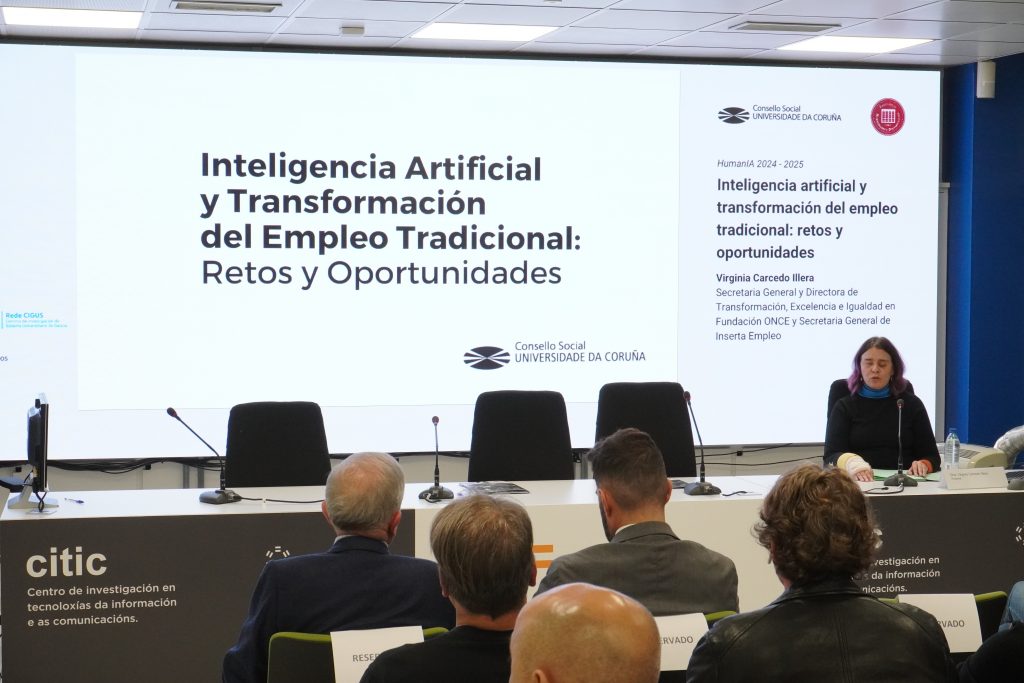
Virginia Carcedo analyzes the impact of AI on labor inclusion in the HumanIA cycle
CITIC hosted a new session of the HumanIA training cycle on Monday, December 16th, titled: “Artificial Intelligence and the Transformation of Traditional Employment: Challenges and Opportunities,” delivered by Virginia Carcedo Illera. The activity is promoted by the Social Council and the Faculty of Humanities of the University of A Coruña (UDC), in collaboration with CITIC.
Virginia Carcedo, a prominent expert in social inclusion and labor transformation, focused her presentation on how generative artificial intelligence technologies are transforming the possibilities for labor and social integration for people with disabilities. During her presentation, she emphasized the importance of designing inclusive technologies from their inception, addressing the ethical challenges and opportunities associated with these tools.
Virginia Carcedo defined 5 stages of evolution of this technology. Starting with chatbots that use AI with conversational language, reaching the final stage, which will be when they can perform the work of an organization. Based on an explanation of the current situation of AI application in the labor market, she provided an overview of the tools currently available, such as ChatGPT, Gemini, or Claude.
One of the central points of the talk was the reflection on the current barriers people face in accessing information and digital environments. In this context, Carcedo highlighted the potential of generative AI to overcome these difficulties through personalized solutions that promote equity. Among the examples presented, she mentioned the generation of automatic subtitles, accessible conversational interfaces, and learning support tools, which are already making a significant difference in the daily lives of many people. During her presentation, she demonstrated the operation of conversational agents such as NotebookML, which helps extract ideas and information from documents, links, or recordings; or GenFM, from IIElevenLabs, which allows the creation of podcasts.
To conclude, she presented the TándEM project, developed by the ONCE Foundation with the support of SEPE within the Recovery, Transformation, and Resilience Plan. They have developed a training program in artificial intelligence tools designed for people with disabilities. “We must be clear that artificial intelligence should be used for social good,” Carcedo stated during her presentation.
HumanIA 2024-2025: A Bridge Between Humanities and Technology
The talk is part of the HumanIA 2024-2025 training cycle, a program designed to analyze how emerging technologies are transforming society and the labor market. Organized by the Social Council and the Faculty of Humanities of UDC, in collaboration with CITIC, this cycle seeks to build bridges between the humanities and the technological field, fostering interdisciplinary dialogue.
Since its inception, HumanIA has brought together professionals from various fields to address key issues related to the future of employment, digital ethics, and social transformation.
About Virginia Carcedo
Virginia Carcedo, a law graduate and specialist in executive management, is a reference figure in the field of labor and social inclusion. She currently serves as Secretary General and Director of Transformation, Excellence, and Equality at the ONCE Foundation, in addition to leading Inserta Empleo. Throughout her career, she has led innovative projects that combine the use of technologies such as artificial intelligence with the aim of promoting inclusive employment.
Among her most notable contributions are initiatives such as Portalento Lattam and her participation in the governing bodies of entities such as Grupo ILUNION and REDI. In 2023, her commitment to equal opportunities earned her the Women in Retail award for inclusion, consolidating her as a reference in the intersection between technology, inclusion, and social transformation.





